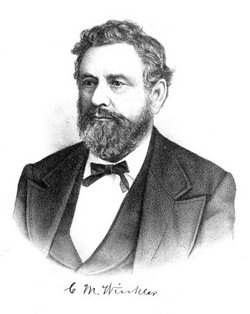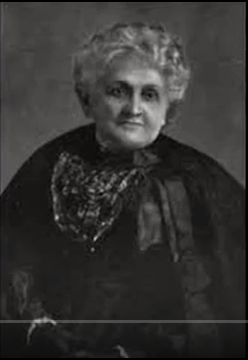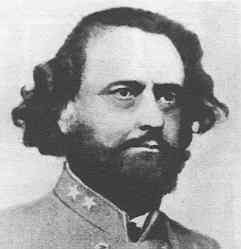 Clinton
McKamy Winkler, Confederate soldier, lawyer, and judge of the Court of
Appeals, was born in Burke County, North Carolina, on October 19, 1821,
the Son of David Tate and Livina Gates (Owen) Winkler. Born into the
family on a small farmer, young Clinton did not have an opportunity for
a formal education. However, at the hands of rural schoolmasters and his
mother, who was the daughter of a prominent teacher, his education was
not neglected. His family moved to Indiana in 1835, and there he grew to
manhood. When he was not yet nineteen, Clinton
McKamy Winkler, Confederate soldier, lawyer, and judge of the Court of
Appeals, was born in Burke County, North Carolina, on October 19, 1821,
the Son of David Tate and Livina Gates (Owen) Winkler. Born into the
family on a small farmer, young Clinton did not have an opportunity for
a formal education. However, at the hands of rural schoolmasters and his
mother, who was the daughter of a prominent teacher, his education was
not neglected. His family moved to Indiana in 1835, and there he grew to
manhood. When he was not yet nineteen,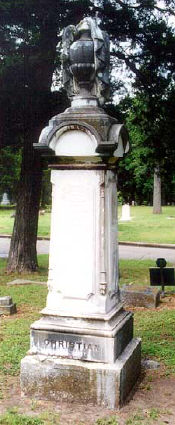 Winkler determined to move to
Texas, and he settled in Franklin, Robertson County, in July 1840. He
very soon became involved in frontier life, joining numerous expeditions
to track down marauding Indians. In 1843 he became district clerk pro
tem. While serving in this capacity, he was admitted to the bar at
Franklin on April 27, 1844, by Judge Robert E. B. Baylor. He was shortly
there after elected to a full term as district clerk. Early residents of
Navarro County claimed that Winkler was instrumental in persuading the
First Legislature to demark Navarro County from Robertson County in
1846. Though the story cannot be documented satisfactorily, Winkler
moved to the new county in 1847. Later that year, he was elected to the
legislature. He is credited with sponsorship of the legislative act
making Corsicana the county seat. On Christmas Eve, 1848, the legislator
married a young widow, Louisa R. Smith. They had three children. At the
expiration of his term of office, Winkler returned to Corsicana and
engaged in the practice of law throughout the next decade. After the
election of Abraham Lincoln, Winkler and six other prominent Navarro countians organized the secession movement in the county. Winkler then
volunteered for Confederate service and was elected commander of the
Navarro Rifles. The Rifles became Company I, Fourth Regiment, Hood's
Texas Brigade, the only unit of Texas infantry to serve in Gen. Robert
E. Lee's Army of Northern Virginia. Captain Winkler led the company
until the battle of Gettysburg, at which he was severely wounded. He was
later promoted to major and lieutenant colonel. At Appomattox Winkler
was in command of the Fourth Regiment. During the conflict, in November
1961, Winkler's wife died in Texas. He married Angelina V. Smith of
Richmond Virginia, on January 7, 1864. To this second union were born
six children. Mrs. Winkler accompanied her husband to Texas after the
war. In Corsicana, Winkler became active in civic, legal, and political
affairs. He helped organize the community's volunteer fire department
and bar association. He became grand master of the state Masonic lodge
in 1870 and helped to organize the Hood's Texas Brigade Association two
years later. Active in the Democratic party in its attempt to end
Reconstruction, Winkler was named state executive committee chairman. In
1872 he was again elected to the legislature. He served only one term,
but returned to public life in 1876 as an associate judge of the state
Court of Appeals. He remained on the bench until his death in Austin on
May 13, 1882. The lifelong Methodist was buried beside his first wife in
Corsicana. Winker County was named in his honor. Winkler determined to move to
Texas, and he settled in Franklin, Robertson County, in July 1840. He
very soon became involved in frontier life, joining numerous expeditions
to track down marauding Indians. In 1843 he became district clerk pro
tem. While serving in this capacity, he was admitted to the bar at
Franklin on April 27, 1844, by Judge Robert E. B. Baylor. He was shortly
there after elected to a full term as district clerk. Early residents of
Navarro County claimed that Winkler was instrumental in persuading the
First Legislature to demark Navarro County from Robertson County in
1846. Though the story cannot be documented satisfactorily, Winkler
moved to the new county in 1847. Later that year, he was elected to the
legislature. He is credited with sponsorship of the legislative act
making Corsicana the county seat. On Christmas Eve, 1848, the legislator
married a young widow, Louisa R. Smith. They had three children. At the
expiration of his term of office, Winkler returned to Corsicana and
engaged in the practice of law throughout the next decade. After the
election of Abraham Lincoln, Winkler and six other prominent Navarro countians organized the secession movement in the county. Winkler then
volunteered for Confederate service and was elected commander of the
Navarro Rifles. The Rifles became Company I, Fourth Regiment, Hood's
Texas Brigade, the only unit of Texas infantry to serve in Gen. Robert
E. Lee's Army of Northern Virginia. Captain Winkler led the company
until the battle of Gettysburg, at which he was severely wounded. He was
later promoted to major and lieutenant colonel. At Appomattox Winkler
was in command of the Fourth Regiment. During the conflict, in November
1961, Winkler's wife died in Texas. He married Angelina V. Smith of
Richmond Virginia, on January 7, 1864. To this second union were born
six children. Mrs. Winkler accompanied her husband to Texas after the
war. In Corsicana, Winkler became active in civic, legal, and political
affairs. He helped organize the community's volunteer fire department
and bar association. He became grand master of the state Masonic lodge
in 1870 and helped to organize the Hood's Texas Brigade Association two
years later. Active in the Democratic party in its attempt to end
Reconstruction, Winkler was named state executive committee chairman. In
1872 he was again elected to the legislature. He served only one term,
but returned to public life in 1876 as an associate judge of the state
Court of Appeals. He remained on the bench until his death in Austin on
May 13, 1882. The lifelong Methodist was buried beside his first wife in
Corsicana. Winker County was named in his honor.
BIBLIOGRAPHY: Memorial and Biographical History of Navarro, Henderson, Anderson, Limestone, Freestone, and Leon Counties (Chicago: Lewis, 1893); The New Texas Handbook (Austin, TSHA 1996) ************
Clinton McKamy Winkler was born in Burke County, North Carolina October 19, 1821. His father was David Tate Winkler, a North Carolina farmer who came to Robinson County, Texas in 1844. He died in 184[?]. The progenitor of the family in America was Conrad Winkler, Clinton's grandfather who came from Germany at an early date, settling in North Carolina and remaining there the rest of his life, a prosperous farmer. Clinton's mother was Lavinia Gates Owen, refined and cultured
lady, daughter of Harrison Owen, and Clinton, together with the rest of his father's family, moved to Indiana in 1835, but the lad remained there only until 1840, when he came to Texas to be with his uncle Harrison Owen at Franklin in Robertson County. This was truly a frontier settlement and the young man immediately became identified with everything that interested the people. The most pressing concern was hostile Indians. Only a few days after his arrival, he joined a company of minute men. They came to a place where the Indians had massacred a whole family and had danced around the victims, leaving moccasin tracks in blood on the cabin floor. Imagine the horror of the sight and the effect upon all who observed! He afterward engaged in several fights against the savages throughout the area of Chambers Creek. The Company was under the leadership of Captain Eli Chandler. Later, he accompanied Captain Thomas I. Smith upon a expedition into Johnson County, where one of their number was killed (Abram Smith). They buried him under four feet of earth and rode back and forth over his grave to obliterate all traces. Thus began the youth's services in behalf of Texas. His first employment at Franklin was that of Deputy County Clerk. His evenings were spent in studying law under that eminent gentleman, Charles H. Raymond. In 1843, he was appointed clerk pro tem of the District Court, which position he held until he was admitted to the bar, in April, 1844, thus receiving his license under the Republic of Texas. As recounted in the Navarro County Scroll for 1958, in the
article about Ethan Melton, by Alva Taylor, people were discussing the
advisability of creating a new county. Several of these drew
up a petition asking that a new county be formed out of Robinson County.
C. M. Winkler was asked to present the petition to the Legislature, he
having been elected to the Legislature in 1848. The temporary seat of justice was on Chambers Creek at the residence of William R. Howe, later in a portion of Ellis County. The new county was given the name of Navarro in honor of the famous patriot, Antonio Navarro. Yielding to Colonel Navarro the honor of naming the new county seat, Corsicana was chosen, the name taken together meaning Navarro the Corsican, Corsica having been the birthplace of Navarro's father. When Mr. Winkler, in 1847, came to reside in the new county, he found only one family - that of the Reverend Hampton McKinney - where he made his home until his marriage to Mrs. Louisa B. Smith, in 1848. Of this marriage, three daughters were born: Lavinia, Mary, and Kate. He, together with David K. Mitchell and Thomas I. Smith, surveyed and laid off the county seat. After his term in the Legislature expired, he returned to Corsicana and engaged in the practice of his profession, always maintaining a high standard of justice. The first general expression in favor of resistance to federal encroachment occurred at a meeting on January 14, 1860, upon the adoption of resolutions signed by C. M. Winkler, William F. Henderson, G. L. Martin, William H. Neblett, Joseph Clayton, Elijah Melton, and J. P. Anderson, the committee. Now, the shadows of war were gathering. In 1861 a company of 150 men was organized to join the Confederate Army, with C. M. Winkler as Captain. This company became a part of the Fourth Texas Regiment of Hood's Brigade which rendered distinguished service in the battles of Gaines' Mills, Second Manasas, Sharpsburg, Gettysburg, Wilderness, and all the campaigns of General Lee's army. When the company surrendered at Appomattox, they had only 12 muskets left. General Lee was high in praise of the Texans. Mr. Winkler's first promotion was to major and later to lieutenant-colonel. He was actually in command of a regiment after the Battle of the Wilderness, and, also after the death of General Gregg, below Richmond, in October, 1864, in command of a brigade until Col. Bass, his ranking officer, recovered from a wound. His first wife having died in 1861, he was married January 7, 1864, to Miss Angelina Virginia Smith in the City of Richmond, Virginia. Six children were born to this marriage. Clinton Jr., Walton C., Tom L., Beatrice Elizabeth, Harry, and Myra C. Little Harry died in infancy. In 1865, after the war had ended, Mr. and Mrs. Winkler came to Texas. For him, it was a return home; for her, an entirely new experience. If the contrast in conditions was too striking, nobody ever heard her say so. Federal troops were stationed in Corsicana and many encounters between the soldiers and townspeople had to be smoothed away. As continual peacemaker, Mr. Winkler could be depended upon, always. In 1872, he was made chairman of the State Democratic Executive Committee. His address to the Democrats of Texas had the ring of true patriotism. He was a member of the famous Thirteenth Legislature which took Texas out of the hands of the Radicals. In 1876 he became a member of the original Court of Appeals, which positions he held until his death in 1882. The ten volumes of the opinions of the Court tell the story of his industry and devotion to duty. He died in Austin, May 13, 1882. Judge Winkler was a charter member of the Masonic Lodge in Corsicana. He organized the Bertrand du Gueslin Commandery of Knights Templar. Was made Grand Master, State Masonic Lodge in 1870. He was Grand Captain General of Grand Commandery. He took 32nd degree of Scottish Rite Masonry in April 1882. Resolutions on the death of Judge Winkler, as contained in records of the Court and Masonic bodies, are eloquent in their testimony of their love for one who, throughout his life, demonstrated his love for them. Judge Winkler was a consistent member of the Methodist Church and his family religion was exemplified in their lives. The organized of Confederate Veterans at Corsicana was named in memory of Colonel Winkler.
See Also: |
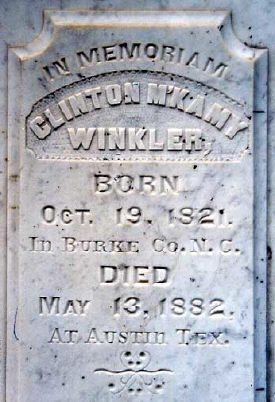 educator of great merit. Their ancestors came from England,
settling in Virginia; were among the foremost families of that region;
were loyal to the colonies and assisted greatly in the Revolutionary War
for Independence.
educator of great merit. Their ancestors came from England,
settling in Virginia; were among the foremost families of that region;
were loyal to the colonies and assisted greatly in the Revolutionary War
for Independence.